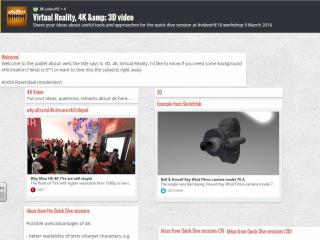Two tools for exchanging thoughts online
| Date: | 01 July 2016 |
| Author: | André Rosendaal |

Recently, I came across two free tools that were used before, during and after meetings: Padlet and Tricider. With these tools, you can collect ideas from participants of an event; clearly, that could also include lectures or other educational meetings....
Padlet is like a bulletin board where people can add content. That content may be text, images, videos, links to webpages etc. A moderator can move and order the contributions and thus make the padlet more readable. As said, you can use the tool while preparing your event (add some discussion points, propositions, useful links, etc.) and invite the participants to add their comments and ideas. Or you wait until the event has started and then open up a padlet and ask your audience to contribute. You can choose to react to the contributions at a suitable moment - e.g. at the end of your presentation. If you want, you can leave the padlet open after the event, so people can still add their remarks, suggestions etc. There are many possible uses for education. A teacher could use it to get feedback on what students are learning, as a brainstorming tool, to collect group work outcomes or as an open space for discussion. Student can use it as a portfolio tool, for making notes, etc.
A few other suggestions can be found at DITCH that textbook. And this is a padlet on video and virtual reality I used for a workshop.
Padlet is free. There is also an educational license with more possibilities.
Tricider is more question based. It is comparable to an online survey, but on Tricider, people can see each other's answers and arguments. They can add a comment or vote for the best answer/idea/proposal. In class, you could use Tricider to start discussions or brainstorms with your students online, e.g. before class. A short video explains it all. Tricider is also free.

